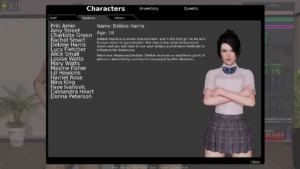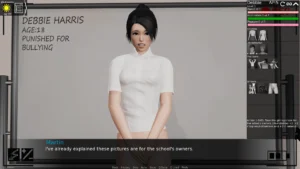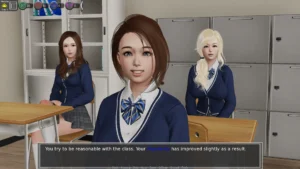
The Headmaster
Play The Headmaster
The Headmaster review
Explore Gameplay, Characters, and Strategies in The Headmaster
The Headmaster is a unique interactive game that blends narrative depth with complex character development and strategic gameplay. In this guide, we dive into the core aspects of The Headmaster, including its gameplay mechanics, character dynamics, and how to navigate its distinctive systems. Whether you’re new or looking to deepen your understanding, this article offers practical insights and tips to help you get the most out of your experience with The Headmaster.
Understanding The Headmaster Gameplay and Mechanics
What Makes The Headmaster Unique? 🎭
Let’s be honest, when you first hear about a game where you play as a headmaster, you might picture budget spreadsheets and boring faculty meetings. I know I did! But The Headmaster is a different beast entirely. It throws you into a gothic, supernatural-tinged boarding school where your primary tools are not lesson plans, but a keen eye for student secrets and the absolute authority to discipline them. The core of The Headmaster gameplay is this intoxicating blend of power, mystery, and moral ambiguity.
What truly sets it apart is its atmosphere. You’re not just managing a school; you’re navigating a web of eerie occurrences and deeply troubled individuals. The game masterfully uses its setting to create a constant sense of unease. One moment you’re dealing with a simple case of truancy, the next you’re uncovering a dark secret that shakes the very foundations of the academy. This isn’t a school simulator; it’s a psychological narrative where your office is the command center for unraveling a grand, unsettling mystery. The way the punishment system The Headmaster employs is woven directly into this narrative is pure genius, making every decision feel heavy with consequence.
I remember my first playthrough, I thought I could be the “nice” headmaster. I issued gentle warnings and gave second chances. Big mistake. The student body quickly spiraled into chaos, and I missed crucial clues because I wasn’t being firm enough to uncover the truth. This game doesn’t reward passive play. It demands you lean into your role, and that’s what makes it so compelling and unique. Understanding how to play The Headmaster effectively means embracing this complex, often uncomfortable, power dynamic.
Navigating the Punishment and Discipline System ⚖️
This is the heart and soul of the experience. The discipline mechanics The Headmaster has crafted are deceptively simple on the surface but contain incredible depth. Your main interface with the students is through a direct, one-on-one disciplinary meeting. A student is brought to your office for a transgression, and it’s your job to investigate and pass judgment.
The system revolves around a Punishment Meter. You raise this meter by successfully uncovering the full truth of a student’s misbehavior. This isn’t about just accepting their first excuse. You need to probe, question, and sometimes intimidate to get to the bottom of things. Here’s a personal insight: I learned early on that being too lenient doesn’t fill the meter, and being too harsh too quickly can shut a student down entirely. The key is a gradual escalation.
You have a toolkit of disciplinary actions at your disposal, ranging from mild to severe:
* Verbal Reprimands: A simple scolding. Low impact, but good for minor, first-time offenses.
* Detention: The bread and butter of discipline. Effectively manages behavior without being overly cruel.
* Corporal Punishment: A more severe option. This is where the morality choices The Headmaster presents become critical. It’s highly effective at raising the punishment level and extracting information, but it comes at a significant cost to your rapport with the student.
* Expulsion: The ultimate sanction. This is a permanent decision that removes a character from the game entirely. Use it sparingly, as expelled students can’t provide future information or be part of story arcs.
The brilliance of this punishment system The Headmaster designed is that it’s not just a menu of actions. It’s a psychological game. You learn to read student body language. Do they look nervous? Defiant? Are they hiding something? Choosing the right disciplinary action based on the student’s personality and the severity of their crime is a core strategies for The Headmaster game.
Pro Tip: Don’t just go for the maximum punishment every time. A student given detention for a small lie might be more willing to confide in you later about a bigger secret, becoming a valuable informant. Building this network is a crucial gameplay tips The Headmaster veterans use.
Here is a breakdown of how the punishment levels typically function within the game:
| Punishment Level | Primary Effect | Impact on Student | Strategic Use |
|---|---|---|---|
| Low (Verbal Warning) | Minimal behavior correction | Very low stress, maintains rapport | Best for trivial offenses or when you want to appear benevolent to gain trust. |
| Medium (Detention) | Effective behavior management | Moderate stress, slight dip in rapport | Your most commonly used tool. Balances authority with maintaining a functional relationship. |
| High (Corporal Punishment) | Strong behavior correction, high information yield | High stress, significant drop in rapport | Use when you desperately need information or to make an example of a repeatedly defiant student. |
| Maximum (Expulsion) | Permanent removal | Character is gone from the game | A last resort for the most severe crimes or to permanently remove a problematic element, but you lose any future potential from that student. |
Role of Choices and Morality in Gameplay 🧭
If the punishment system is the game’s heart, then the morality choices The Headmaster confronts you with are its soul. This isn’t a game with a simple “good vs. evil” slider. Your decisions exist in a murky gray area. Is it wrong to be harsh with a student to uncover a truth that could save others? Is showing mercy to one student being unfair to the rest of the school body? The game constantly poses these difficult questions.
Your choices directly impact two key areas: Student Rapport and Story Progression.
-
Student Rapport: Every interaction changes how a student views you. A student you’ve been fair with might sneak you a note warning about a brewing conflict. A student you’ve been brutally harsh with might spread rumors, turning other students against you, or even plot revenge. I once expelled a popular student for a serious crime, and for the next week, I faced organized silence and petty rebellions from his friends. The world feels alive and reactive.
-
Story Progression: This is the big one. The Headmaster gameplay is driven by the secrets you uncover. Often, the only way to pry a crucial piece of information loose is to employ severe discipline. You are constantly trading your moral standing for narrative progress. You might have to sacrifice a positive relationship with one character to learn a secret that allows you to help another. There is no “perfect” path where you see everything and are loved by all—and that’s the point.
Let me give you a case study from my playthrough. There was a student, let’s call her Lily, who was clearly being bullied. I knew who the main bully was, but I had no proof. I could:
1. Go easy on Lily, build rapport, and hope she eventually trusted me enough to tell me everything (slow, uncertain).
2. Interrogate the bully harshly to force a confession (effective but morally questionable and would damage my standing with that student and their circle).
3. Do nothing and hope evidence presented itself (a passive strategy that often fails).
I chose option 2. I got my confession and was able to protect Lily, but the bully’s group of friends made my life difficult for a long time afterward. It was a “win” that felt like a loss, and that’s the emotional core of this game. Your morality choices The Headmaster lays out define not just the story, but your own experience of being the headmaster.
Putting It All Together: Your Strategic Playbook 🎯
So, how do you synthesize all this into a successful approach? Here are some essential gameplay tips The Headmaster challenges demand you learn.
- Start Firm, But Fair: Your initial impression sets the tone. Don’t be a pushover, but avoid maximum punishments early on. Use detention frequently to establish your authority without creating martyrs.
- Information is Currency: Always be digging. The core loop of how to play The Headmaster is investigation. A student punished for skipping class might reveal a secret meeting spot; a student caught fighting might know about a hidden contraband ring. Follow every thread.
- Choose Your Battles: You can’t be everywhere at once. Focus your disciplinary efforts on the students who are central to the main narrative threads or those whose actions are causing widespread problems.
- Manage Your “Network”: Think of students as assets. Some you will need to keep close with lighter punishments. Others, you may need to break down with severity to get what you need. It’s a cold, calculated, but necessary part of the strategies for The Headmaster game.
- Embrace the Consequences: Don’t reload a save every time you make a decision you regret. The most powerful stories in The Headmaster come from dealing with the fallout of your choices. Let the narrative be messy and personal.
Ultimately, mastering The Headmaster gameplay is about understanding that you are not a hero in a traditional sense. You are a flawed individual wielding immense power in a broken system. The game doesn’t judge you for your choices, but it ensures you always feel their weight. It’s a challenging, thought-provoking, and utterly unforgettable experience that redefines what a narrative-driven game can be.
The Headmaster offers a rich, immersive experience through its detailed gameplay mechanics and character-driven narrative. Understanding the punishment system, the impact of your choices, and the unique morality framework is key to mastering the game. Whether you prefer a strict or lenient approach, the game adapts to your style, providing a personalized journey. Dive in with patience and strategy to fully enjoy what The Headmaster has to offer.



















